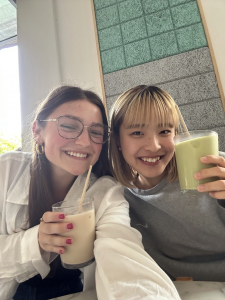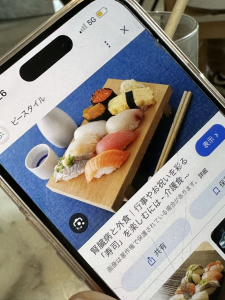Connections Around the World
Hola!!
For our blogs this week, we had the unique opportunity to get to have a conversation with someone from another culture. Honestly, I was a bit nervous at first but I knew it would push me outside my comfort zone AND be a worthwhile experience getting to know someone new. This is a bit of a longer blog because I did not want to leave anything out, so thank you for the time you spend reading this! 🙂
There is a girl who is in two of my four classes, whom I’ve made small talk with but haven’t put in the effort to get to know. Her name is Hatsune and she is from Japan! What a sweet and kind girl! I am so thankful I got to know Hatsune better AND got to learn more about her culture.
Hatsune and I met up at a coffee shop and talked for an hour and a half, both about the questions I had wanted to ask her about Japan and getting to know one another better. Something really cool about the conversation we had was that we did it all in Spanish! Her first language is Japanese, and mine is English, but we were able to meet in the middle, and we communicated best in Spanish.
I came prepared with some questions to ask her, some that I came up with on my own and some from a good friend who is studying in Ireland. 🙂
Hatsune Arima is 21 years old, born in 2002 in Tanegashima, Japan. She lived in her home city, Tanegashima, for 18 years of her life but when she attends her home university, she lives in Osaka. Hatsune attends a school in Osaka that has a specific focus on cultures and languages. She is spending a year in Madrid to continue her studies in Spanish. I am always curious to know why people choose to study what they do, so I asked her why she chose Spanish. She told me that when she was younger, in primary and secondary school, it was mandatory to learn English, “la primera lengua del mundo.” (The first language of the world) She spent lots of years learning English so when she began her studies at her university, she had a choice of what language she could learn. Hatsune found so much interest in the history, language, stories, and culture of Spanish-speaking countries. She stated, “Me interesa mucho el español.” It is very evident to me that she loves the culture and the language because of her abilities to speak Spanish as a third language, her interest in cultural activities, and her dedication to stay in Madrid for a whole year!
I was curious to know a bit more about what makes Hatsune, Hatsune! 🙂 In order to do so, I asked questions about her family, her childhood, her interests, and her values!
Hatsune described that she has one sister, Hibiki, who is just about a year younger than her (20 years old). Her parents live in a different city now called Kagoshima, which she visits on occasion. Her parents both are 41 years old and “muy amable.”(Very kind)
When I inquired about the values her family holds, she described how they frequently engage in various activities together, which reflects a common cultural practice in Japan. For example, she said that when it came time for meals her family would eat together, including her grandparents. She also said that when it came time for “excursions” outside of the house, they would always go together, whether this meant a walk in a park, eating in a restaurant, shopping, and more. It is so special when certain cultures value family time to this extent because they can be such influential and important relationships in a person’s life. Hatsune also talked about respect. Respect is a significant value she holds, for her family, others, and especially elders. One important memory that she talked about from her childhood was spending time in her favorite place with her family. She described it as this, “Era una pequeña isla, lejos del centro de Japón con mucha naturaleza, tanto bosques como playas. Nos encantó llevar a nuestros perros a pasear por la playa juntos.” (It was a small island, far from the center of Japan with lots of nature, both forests and beaches. We loved taking our dogs for walks on the beach together.) I could see how meaningful these memories were to her because of how she spoke with such a loving and reminiscent tone.
Some of Hatsune’s interests include: watching videos/shows on Youtube and Netflix, going to cafes to sip on a coffee, reading, and going to museums to look at paintings. She also described how she loves spending time with her friends and making new ones. She loves the Japanese music artist, Shimizu Shota, and loves the song sung by him called, “My Love.”
To my understanding, she does not work during the school year but described how she sometimes works with her Mom at a supermarket when she returns home during university breaks. I asked her about what her dream job would be and she responded, “El trabajo de mis sueños sería trabajar para un agente de viajes y planificar viajes o trabajar en un café con mis mejores amigos.” (My dream job would be to either work for a travel agent and plan trips or work in a cafe with my best friends.) It was so sweet to hear how much her friends mean to her as well as how much she adores traveling and learning about the world. I relate 100%!
When I asked her a bit more about her education experience growing up, she said she does love her academics currently because it is so focused on learning the Spanish language and more about the culture, which includes meeting lots of new people. I asked her, “¿Cuál fue tu año favorito de la escuela y qué lo hizo tan especial?” (What was your favorite year of school and what made it so special?)
Hatsune responded by saying, “Mi año favorito de la escuela fue el segundo año de la escuela secundaria. Yo era miembro del equipo de béisbol. Mi papel era apoyar a los jugadores y ayudarlos en lo que necesitaran. Tenía que ir todos los días para estar con este equipo y fue muy duro, pero muy divertido. Este mismo año, también fui a Singapur por 2 semanas y era la primera vez que era extranjera. En cada “zona” de Japón, eligen a la gente para ir y a mí me eligieron. También tuve el papel de ser el presidente estudiantil de mi escuela. Aprendí mucho y estuve muy ocupado.”
Translation: (My favorite year of school was the second year of high school. I was a member of the baseball team. My role was to support the players and assist them whatever they needed. I had to go every day to be with this team and it was very hard, but very fun. This same year, I also went to Singapore for 2 weeks and it was my first time being a foreigner. In each “zone” of Japan, they pick people to go and I was chosen. I also had the role of being the student president at my school. I learned a lot and was very busy!)
I asked Hatsune if she had a religion or what her religion was. I wanted to ask this question, but in the most respectful way possible, so I told her that if she did not want to talk about it, we did not have to! She explained that she currently does not practice any religion, but her family follows Buddhism, which they also adhered to during her upbringing. I pray that as Hatsune and I spend more time together, I can share Jesus with her.
MORE SPECIFIC TO CULTURE:
Many of my questions were focused on getting to know Hatsune, which certainly plays a part in the meaning of her culture. I did ask some more questions specific to her culture to which she happily responded. 🙂
Here are some of the questions we talked about and her responses:
(I will translate for those who do not speak Spanish) 🙂
What is considered the most respectful and disrespectful in your society?
“It is disrespectful to talk to elders in a way that is rude and well, disrespectful. Here, there are different ways to talk to those who are older than you. In general, Japanese are very respectful to those who are older than them, but the elderly have the utmost respect.”
“It is also very disrespectful to be loud on public transportation. It is usually silent. If anyone every visits, they should have their sound off and do not make calls. It is to respect those around us.”
After our meeting, I looked up a bit more about this and I read that when speaking to an elderly person they add an extra element of respect by adding their “san” (similar to Mr. or Mrs.) after their name. They also use a certain way of communicating politely called “keigo”. I believe “keigo” is what Hatsune was describing in Spanish.
What is your favorite food from your culture? Snack? Drink?
“My favorite food is sushi, but sushi normal. It is more common in Japan. There are various types of fish with rice. I understand that it is different from what “sushi” in America looks like. My favorite snacks are sweets, especially chocolate cookies or cheesecakes. My favorite drink is matcha. When I was growing up, my family would always have another kind of tea called, “Oolong tea” so I would drink that often as well.”
Hatsune showed me a picture of the kind of sushi she loves and I took a picture so I insert it into my blog!
What is your opinion of the United States? Are there stereotypes that you believe to be true?
“The United States is a very big country and is a very free country, with lots of freedoms. There is a variety of people there of different nationalities and is more generous than other countries. In the minds of some older people from Japan, I think the United States does not have a good impression because of our history. The younger generation has a better impression.”
“The stereotypes that Japan has about America are, Americans love to talk and are very fun, but are a bit loud at times. It really depends on the person you talk to.”
“I think that our stereotypes include being very quiet, we do not talk a lot nor express our emotions well, and we have high respect for elders.”
What is the role of women in your society?
“Women do work more than they did in the past but there is still a bit of inequality between men and women. Many women are at home to take care of the children and the home but it is better than before.”
What is a celebration very important in your culture? Can you describe it to me?
“Japanese New Year! Many people will go to a temple or shrine every year on the first day of the January. People whose religion is Buddism go to a temple but people who have the Shinto religion go to a shrine. There, they pray for and wish for good luck for the year they are entering. We also go to the cemetery to begin the New Year with our ancestors. Another celebration that is connected with the New Year takes place on August 13th through 15th. This celebration commemorates and remembers deceased ancestors. It is believed that their spirits return at this time to visit relatives. People take the candles or lanterns to the graves of their families and bring them back to their home to call their ancestors home.”
The final question I asked Hatsune was this:
¿Cómo está estudiando en Madrid dando forma a tu visión del mundo?
(How is studying in Madrid shaping your view of the world?)
She responded, “Mi visión del mundo se ha abierto mucho desde que llegué a España. Me interesan más las culturas de los extranjeros y también las relaciones internacionales. Vivo con una chica española y otra americana, así que ha sido una buena experiencia aprender sobre las diferencias entre las tres culturas.”
(My vision of the world has opened up greatly since I arrived in Spain. I am more interested in the cultures of foreigners and also international relations. I live with a Spanish girl as well as an American girl, so it has been a good experience learning about the differences between all three cultures.)
Hatsune graciously agreed to meet with me and tackle questions that prompted deeper reflection than she initially anticipated. Several moments during our conversation left me pleasantly surprised, exclaiming, “Wow, that’s fascinating!” or “I had no idea”. This experience highlighted the potential for personal growth through expanding my understanding of the world and different cultures, demonstrating how informal discussions can foster significant development. What a testament to the incredible diversity and beauty of the world and those in it, created by our Savior.


